|
|
|
Sort Order |
|
|
|
Items / Page
|
|
|
|
|
|
|
| Srl | Item |
| 1 |
ID:
131882
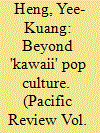

|
|
|
|
|
| Publication |
2014.
|
| Summary/Abstract |
Many studies of Japan's soft power are premised on the 'affective' dimensions of its kawaii pop culture that generate liking or interest. While entirely warranted, emphasising cultural attraction does not do sufficient justice to the multi-faceted foundations of Japanese soft power. Neither does it recognise other components of Joseph Nye's soft power framework stressing the 'normative' appeal of policies that reflect global norms. This article investigates the 'normative' dimensions of Japan's soft power on climate change, and whether it translates into international influence, as Nye predicted. The first section examines the Cabinet's 2010 New Growth Strategy, identifying a potential source of 'normative' soft power in its self-proclaimed desire to reinvent Japan as a 'trouble-shooting nation on global issues', specifically environmental challenges. Next, it analyses how Japanese entities (government, corporations, and NGOs) can transmit 'normative' soft power, and obstacles encountered. These transmission mechanisms include 'Cool Earth Partnership' programmes, the 'Future City Initiative' and the values-based Satoyama Initiative. The final section addresses conceptual implications that arise, and assesses whether Japan's 'normative' soft power has paid dividends. Drawing from literature on pioneer states and external reviews of Japan's alignment with key climate norms, the paper suggests that Japan's normative soft power is lacking in driving agendas at global climate forums. At a pragmatic problem-solving level, however, Japan is increasingly perceived as an attractive source of transferable solutions, reflecting climate norms such as developing eco-friendly technologies and providing assistance to help vulnerable countries mitigate climate change
|
|
|
|
|
|
|
|
|
|
|
|
|
|
|
|
| 2 |
ID:
133107
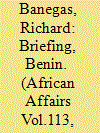

|
|
|
|
|
| Publication |
2014.
|
| Summary/Abstract |
Since 2012, political tension has threatened to undermine Benin's image as a model democracy. The President's efforts to amend the constitution to enable him to contest a third consecutive term, alongside the persecution of some of his former allies, have created a climate of political uncertainty. As a result, a wave of civic protest has gained momentum, a general strike launched in January 2014 lasted for more than four months, and the Catholic Church has broken its silence and denounced the excesses of those in power for the first time since the National Conference in 1990. This Briefing argues that these developments can be considered, on the one hand, as an extension of Benin's passive democratic revolution, a process whereby the co-option of actors from different generations and social strata - the expansion of the "politics of the belly"1 - facilitated the transition from one-party to multi-party rule. On the other hand, the highly volatile situation of the last two years could be said to mark a shift towards a more confrontational scenario of hegemonic rupture in which past agreements on how to share power are torn up by a President determined to capture all economic and political opportunities for himself.
|
|
|
|
|
|
|
|
|
|
|
|
|
|
|
|
| 3 |
ID:
130814
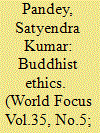

|
|
|
|
|
| Publication |
2014.
|
| Summary/Abstract |
Buddhist Ethics is imbedded in the fabric of Noble Eightfold Path which prescribes certain do's and don's in order to get rid of suffering and attain the highest goal of Eternal Bliss (Nirvana). Though, the basic purpose of Buddhism is to make the people aware of existential problem of suffering and to enable them to get rid of it, it has touched almost all aspect of human life. The formulation of Buddhist ethics in fom1 of moral code is one of them.
Ethics generally deals with human conduct and is concerned with questions pertain to what is good and bad, what is right and wrong, what is virtue and vice, what is just and unjust, what are our duties and rights. There are divergent views with regard to the scope and nature of ethics. Modern ethical philosophers belonging to the Analytic school of philosophy consider it their task merely to analyses and clayey the nature of ethical concepts or theories. For them, ethics constitutes a purely theoretical study of moral phenomena. They do not consider it their province to lay down codes of conduct, which they deem to be the function ofa moral teacher, a religious leader or a prophet.' However, some of the Existentialists philosophers consider it the duty of philosopher to recommend ways of life or modes of conduct which they consider desirable for the purpose of achieving some end which they regard as valuable. Kierkegaard, for instance, considers that there are three stages of life, namely, the aesthetical or sensualist, the ethical and the _religious. He indirectly recommends in his philosophy that we pass from one state to another. The aesthetical or sensualist way of life. according to him, leads to boredom, melancholy and despair, so it needs to be trans?gured in the ethical stage. and so on? When we peruse the Buddhist Ethics in this background, we see that it has an analytical study of ethical concepts and theories as well as positive recommendations to lead a way of life-' for attainment of the highest good, the supreme eternal bliss (nirvana) as well as the realization of ultimate truth
|
|
|
|
|
|
|
|
|
|
|
|
|
|
|
|
| 4 |
ID:
129193
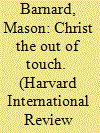

|
|
|
|
|
| Publication |
2014.
|
| Summary/Abstract |
A majestic, powerful figure, Christ the Redeemer stands far above the Brazilian city of Rio De Janeiro-a physical manifestation of the power and authority of the Catholic Church. Upon its completion in 1931, the statue symbolized the hope and prosperity of Catholicism in Latin America. But no longer. In the slums and favelas below Christ's welcoming embrace, fewer and fewer turn towards the Catholic faith for solace.
Protestantism and similar, more liberal Christian sects continue to grow across the region-a result of long term demographic changes. A wide variety of missionary groups, primarily Evangelicals from North America, arrive each year to successfully spread the faith in areas with little influence from the church or the state. Over 50,000 Evangelicals ar- rive in Honduras alone each year. Without social services, missionaries fulfill a critical role in providing infrastructural
|
|
|
|
|
|
|
|
|
|
|
|
|
|
|
|
| 5 |
ID:
131477
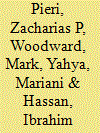

|
|
|
|
|
| Publication |
2014.
|
| Summary/Abstract |
This paper examines the concept of (public) sin as well as efforts to counteract sin from the perspective of Islam. The understanding that hisba, the prohibition of vice and enjoining of virtues, are a responsibility of both the state and the community is common in historical and contemporary Muslim societies. Where the state cannot or does not provide means for countering (public) sin, the perception for some Muslims is that the responsibility on the community and individuals to do so increases. Based on ethnographic research in Britain, Nigeria, Indonesia, Malaysia, and Singapore, the paper highlights examples of how sin has been defined amongst Muslim communities as well as the methods and rationales given to justify the forbidding of sin as a collective and communal public obligation. As the world becomes more integrated, there is growing concern amongst Muslim communities that sin is becoming the norm, leading society to degeneracy, that people who would not have otherwise sinned are influenced to do so. Common features in forbidding sin across Muslim communities have appeared, often focusing on what are seen as moral issues such as dress codes, music, gambling, alcohol, smoking, and the mixing of men and women in public. The forbidding of sin has resulted in attempts to introduce "Shari'a Zones" in some predominantly Muslim areas of London, whilst in Indonesia, this has given rise to the Islamic Defenders Front and in some Northern Nigerian states to the reintroduction of the criminal codes of the Shari'a.
|
|
|
|
|
|
|
|
|
|
|
|
|
|
|
|
| 6 |
ID:
133814
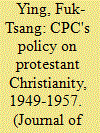

|
|
|
|
|
| Publication |
2014.
|
| Summary/Abstract |
After the establishment of the People's Republic of China (PRC) in 1949, the state-church relationship in China entered a new phase. This article, which is substantially based on party reports and archival documents, attempts to reconstruct and assess the party-state's policy on Protestant Christianity from 1949 until the eve of the Anti-Rightist Movement in 1957. The focus is not on the repeated dichotomy between 'state' and 'religion' but explores multiplicity and interaction as two possible aspects of the church-state relationship. The article investigates the following questions: what were the factors influencing the formation and development of the Communist Party of China's (CPC) policy on Protestant Christianity after the establishment of the PRC? Were there multiple actors within the party-state and Protestant Christianity? What kinds of relationships existed between the party-state and Protestant Christianity? Particular attention is given to how the CPC chose between 'struggle' (douzheng) and 'unity' (tuanjie) when dealing with Protestant Christianity under ideological constraints and complex political situations.
|
|
|
|
|
|
|
|
|
|
|
|
|
|
|
|
| 7 |
ID:
130808
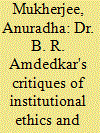

|
|
|
|
|
| Publication |
2014.
|
| Summary/Abstract |
Ethics and morality are the milestones of civilization in the true sense of the term. These concepts again are not static but evolve with greater implications and subtler nuances as humanity strives to grow towards perfection- the ultimate end of existence. ' whether biologically or spiritually. In the context of Indian thought, the traditional, age-old dictums of ethics and morality. having undergone numerous interpretations and changes have experienced a new set of values,' however latent in the traditional interpretation of Dharma or Niri- with the advent of" nationalism, the emergence of a new nation-state and the concurrent vision of human rights. The Constitution of India fully recognizes the moral as at par with the modem, that is, the western ideals of morality in the realization that in the context of Dalit uprising in modern India, the traditional ideals of ethics and morality are to be reviewed. Obviously this shows that what is legal should be ethical and moral or rather. what is ethical and moral tnust have its place in law. It is from this perspective that the modern-day Dalit struggle against injustices, age-old as they are. are to be seen and Dr.B.R. Ambedkar's initiation to this struggle was aimed at bringing ethics and morality to work at the state level, subjugating the Nili forest while lawgivers to take a backseat before the universal laws of morality. To understand Ambedkar's stand on the place of ethics and morality in Hinduism, one must see the reasons that made him strike out at the roots of Hindu social ethics. The Hindu social life was traditionally ruled by Dilemma. Dharma guided a Hindu's'Iife from birth to death by a set of rules strictly laid out for everyone in society. The observation of these rules was morality and the underlying ethics of these duties and rights was ?rst ofall, societal good, i.e., good for 'all. The second part of this ethics was that by observing this social morality, an individual will attain perfection. In accordance with these concepts, the Dharmas/zastras dictate the functions ofthe state and the king. The Nili and Dandanili emanate from one source and with one ideal- that is to maintain the social order by arranging for the speci?c duties of each and every member of society. Consequently. rights came as group rights and institutional rights as laid out in the Dharamshastra'. And over and above everything was the belief in the law of Karma that sanctified the rule of l/Z7I'l7aS/1I'uII7(l, or ones station in life as prescribed by onc's birth. These two essential features of Hindu society made it a highly stratified one so that the passage of' centuries only tightened the rules and the rituals pertaining to these two rules. The solemn and noble hymns of Rigveda. where the philosophy of Vedic seers and poets as the world being one and where everyone was the other's kin. I Va.t'zzdlmibu Kzzrumba/(um )' is the spirit of the ancient Indian Vedic realization. The utmost ideals of human dignity with the universal ethics of righteous behavior and the universal morality of conscientious behavior were preached in their fullest glory. . '
|
|
|
|
|
|
|
|
|
|
|
|
|
|
|
|
| 8 |
ID:
133098
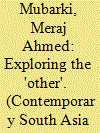

|
|
|
|
|
| Publication |
2014.
|
| Summary/Abstract |
The aim of this paper is to explore Hindu-Muslim relations through the cinematic register of on-screen inter-faith marriages, and critique the undercurrent of 'Otherness' that undergirds most of these narratives in the post-Hindutva milieu. Since the Hindu female embodies the (Hindu) nation in popular imagination, Muslim males gain access to Hindu females only within narrations of perfidy and 'inappropriate appropriation', signifying their perceived 'Otherness'. The cohabitation of the Muslim female with a Hindu male, on the other hand, is framed within quotidian love narratives and marks her homecoming or gharwaapsi. Even as it offers national integration as its central motif, Jodhaa Akbar (JA) offers a narrative in which Akbar must be sufficiently indigenized and homogenized to merit absorption into the nation. JA both participates in and responds to the construction of this 'Otherness', as I shall demonstrate. While charting a new cartography of cinematic terrain where the faith of a minority group occupies the centre stage, JA nevertheless presents a Hindutva polemic aware of accusations of self-aggrandizement and thus amenable to hegemonic concerns.
|
|
|
|
|
|
|
|
|
|
|
|
|
|
|
|
| 9 |
ID:
133304
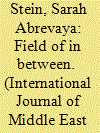

|
|
|
|
|
| Publication |
2014.
|
| Summary/Abstract |
In the spring of 1902, Miryam bint Lalu Partush appealed to military representatives in Ghardaïa, in the Mzab Valley (a valley of five fortified oasis cities in the northern Algerian Sahara, six hundred kilometers south of Algiers), for the paperwork that would allow her to undertake a six-month pilgrimage to Jerusalem with her husband, the wealthy merchant Musa (Moshe) bin Ibrahim Partush. Miryam Partush was unusual in possessing the means for such a rare, costly voyage; but notwithstanding her class, Partush's legal status was typical of most Muslims and southern Algerian Jews in Algeria. She was not a citizen, nor did she hold official papers of any kind. When Miryam Partush appealed to the military authorities in Ghardaïa, then, she was appealing for many things: for the right to leave her native valley and travel to the port of Algiers; for the papers that would allow her to cross colonial boundaries; and for the documentation that would register her liminal legal identity. Authorizing her travel, Algeria's governor-general named Partush a "non-naturalized Jew from the Mzab." Thus did Partush embark on her six-month journey with a negative legal identity: this Jewish woman was definable, in the eyes of the law, only by what she did not possess.
|
|
|
|
|
|
|
|
|
|
|
|
|
|
|
|
| 10 |
ID:
131475
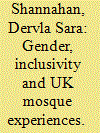

|
|
|
|
|
| Publication |
2014.
|
| Summary/Abstract |
Access to, management and attendance of places of worship often takes gendered forms. Gender imbalances in UK mosques manifests in attendance and management patterns and is reflected in the facilities available. The sense that mosques are perceived widely as 'prayer-clubs for men' (Maqsood 2005: 4-5) is often reflected in the physical spaces and facilities made available to female worshippers, and it must be noted that some mosques do not provide any of the latter at all (Dispatches 2006). Shockingly, a recent survey found that 'women form part of the congregation in [only] half (51%) of the organisations surveyed' (Coleman 2009: 10). Relatedly, UK Mosque management committees privilege male involvement, decision-making and leadership roles, with figures of as few as 15% women in management positions (Asim 2011: 34) and more who 'will simply not entertain the idea' (Asim 2011: 39). Such imbalances reflect the specificities of the UK-religious context (Maqsood 2005) yet, globally, women's mosque involvement appears to be changing far more rapidly than here. This paper explores how gender, religious identity and sexualities interface with women's mosque access, involvement and experiences therein. It draws upon original research with a sample of women, and indicates that inclusivity is an important topic in UK mosques, far beyond gender
|
|
|
|
|
|
|
|
|
|
|
|
|
|
|
|
| 11 |
ID:
130827
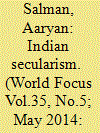

|
|
|
|
|
| Publication |
2014.
|
| Summary/Abstract |
"I believe in a religion based on universal and all-embracing principles which have always been accepted as true by mankind - the primeval eternal an religion, which means that it is above the hostility of all human an creels whatsoever. " - -Swami Dayananda Saraswati. There can be little debate on the In?uence of co Religion on Human History. The overwhelming impact of Christianity, Hinduism, Zoroastrianism, Judaism, or Islam on Civilization is seen not only in the cultural pl: semblance and value system which emerge from their - D2 teachings, but also re?ects in the effects they've had Ul on mankind. un an Believers and Unbelievers alike have acknowledged the profound in?uence of religion on ha individuals, societies and on humanity's collective life. the Religion was and is a power that's here to stay with above both the western and eastern hemispheres! that will On the other hand, Religion was and is still the considered a pariah' by Western Secularism! According are to historian R. Scott Appleby "Religion, at last, can no be longer be ignored". This was one of ?ve "unintended, unforeseen" consequences of 9/ l 1. HI In present day, challenges are manifold both co at domestic and at international level. Most political of con?icts end up passing through the prism of religion» pr. or ethnicity and are claimed to be the trigger factor in cl: many con?icts. The relationship between Religion and special Con?ict is complex.3'And Religion is at the heart of the Secularism Debate as Ethnicity and Religion have been an the building blocks of an lndividua1's Identity. Appleby hi: de?ned religion as 'the human response to a reality m: perceived as sacred
|
|
|
|
|
|
|
|
|
|
|
|
|
|
|
|
| 12 |
ID:
125025
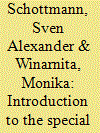

|
|
|
|
|
| Publication |
2013.
|
| Summary/Abstract |
The second half of the twentieth century witnessed the rise of what might arguably be described as political religion, with faith traditions everywhere experiencing parallels to the rise of Hindutva in India or the 'muscular' and virulently anti-minority political Buddhism of Sri Lanka and Myanmar. Similarly, Israel, a country founded by cosmopolitan, social-democratic nineteenth century perceptions of Jewish 'national' identity, is increasingly struggling with its ostensibly secular founding ethos. Religiously conservative political parties and attitudes have become mainstreamed in Israel's political landscape in the last couple of decades.1 What might help account for these seemingly similar developments, all of which appear to contradict the basic dictum of secularization theory, namely that increasingly prosperous, urban and industrialized societies will relegate religion and religious practices to the private sphere of a personal 'faith'? Until recently, the assumption persisted that the historical experience of Western Europe, the first part of the world to undergo industrialization and the wider sociocultural effects associated with the process of 'secularization', would be replicated as other parts of the world modernized. An important debate has ensued over the past 20 years or so, involving scholars representing a wide range of disciplinary backgrounds over what appears to be the revitalization of religion and even possibly processes of de-secularization.
|
|
|
|
|
|
|
|
|
|
|
|
|
|
|
|
| 13 |
ID:
131855
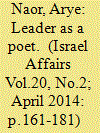

|
|
|
|
|
| Publication |
2014.
|
| Summary/Abstract |
This article analyses Ze'ev Jabotinsky's Zionist ideology as expressed in his political poetry. It includes inter alia lessons from the pogroms, the need for emergence of 'a new Jew' who would show by his conduct that he is 'a son of kings', who is ready to either die or capture the mountain, believing in the Jewish national right over the Land of Israel on both banks of the Jordan, as well as in the rights of its Arab and Christian inhabitants. These and other ideological principles appear in his poetry alongside a war of words with the Zionist left.
|
|
|
|
|
|
|
|
|
|
|
|
|
|
|
|
| 14 |
ID:
130847
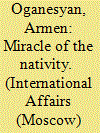

|
|
|
|
|
| Publication |
2014.
|
| Summary/Abstract |
The author offers opinions on Christianity. The birth of Jesus Christ is said to have occurred at a period when regard for human life was almost nil. Agreement is expressed with early 20th century Orthodox theologian St. Justin Popovic's contention that Christianity's singular feature was its call for believers to remain faithful and without sin in a world where evil is always present.
|
|
|
|
|
|
|
|
|
|
|
|
|
|
|
|
| 15 |
ID:
130796
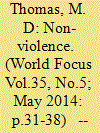

|
|
|
|
|
| Publication |
2014.
|
| Summary/Abstract |
Ethics and Indian civilization, political thought; global implication is a valid search into the global implications of the ethics grounded in the national ethos of the ideological, political, religious, social and cultural dimensions of the great civilization the word India stands for.
|
|
|
|
|
|
|
|
|
|
|
|
|
|
|
|
| 16 |
ID:
132734
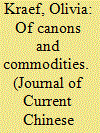

|
|
|
|
|
| Publication |
2014.
|
| Summary/Abstract |
The Nuosu are a subgroup of the so-called Yi ethnic group. Today around two million Nuosu live in Liangshan Autonomous Prefecture in Sichuan Province and translocal urban contexts, such as Chengdu and Beijing. For many centuries, the Nuosu have cultivated a belief system composed of a combination of animism and ancestor worship. Since the resurrection of religious activity across China that began in the early 1980s, this faith - represented by the three types of religious practitioners known as bimo, sunyi, and monyi - has reportedly been experiencing a comprehensive revival at folk level. For the bimo, this revival has been paralleled and increasingly overlaid by a scholarly reappraisal of Nuosu religion under premises other than religious. Bimo practice and identity have thus become subsumed under the illustrious concept of "bimo culture". In this article, I trace the genealogy of the concept of "bimo culture" as part of a cultural canon of and for the Yi which is intended to promote development at the local level but which is also contributing to a weakening of the status of the bimo and Nuosu ritual life in Liangshan today.
|
|
|
|
|
|
|
|
|
|
|
|
|
|
|
|
| 17 |
ID:
131490
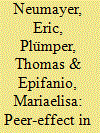

|
|
|
|
|
| Publication |
2014.
|
| Summary/Abstract |
Existing accounts posit that defensively oriented counterterrorist policies create negative externalities and result in regulatory competition that induces governments to increasingly tighten their policies. We argue that rather than causing an unconditional global "race to the top," spatial dependence in counterterrorist policies is limited to within groups of countries exposed to a similar level of threat from international terrorism. Countries strongly differ in their propensity to become the target of an international terror attack. Governments can safely ignore counterterrorist policies enacted by countries outside their "peer group," but they must pay attention to measures undertaken by their peers. We test several predictions derived from our theory in an empirical analysis of counterterrorist regulations in twenty Western developed-country democracies over the period 2001 to 2008.
|
|
|
|
|
|
|
|
|
|
|
|
|
|
|
|
| 18 |
ID:
132960
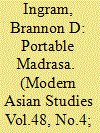

|
|
|
|
|
| Publication |
2014.
|
| Summary/Abstract |
In the first decades of the twentieth century, classically trained Muslim scholars (`ulama) of the influential Deobandi school of North India issued a number of immensely popular, mass-printed 'primers' on Islamic belief and ritual practice. Now ubiquitous in the Islamic bookshops in South Asia and elsewhere, these primers sought to summarize the rudiments of an Islamic education for a nascent lay Muslim reading public. Focusing on three Deobandi `ulama-Ashraf `Ali Thanvi (d. 1943), Mufti Muhammad Kifayatullah (d. 1952), and Muhammad Manzur Nu`mani (d. 1997)-this paper explores how their primers advanced the Deobandi school's well-known critique of popular piety even as they claimed to address Muslims generally, and how their authors negotiated the subtle dynamics of print. Understanding the potentially subversive power of print to open a space for readers to form their own interpretations of minute doctrinal matters and the threat of mass-printed religious texts to their own authority, these `ulama implored readers to refrain from forming their own opinions of the primers' content and to consult the `ulama throughout the reading process. Thus, even as they took advantage of print's possibilities, they remained deeply suspect of its ramifications.
|
|
|
|
|
|
|
|
|
|
|
|
|
|
|
|
| 19 |
ID:
131479
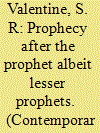

|
|
|
|
|
| Publication |
2014.
|
| Summary/Abstract |
The Ahmadiyya Jama'at, a little known reform movement within Islam, has the majority of its estimated 12 million members living in Pakistan. Believing that there can be prophecy after the prophet Muhammad, albeit lesser prophets, the Movement has been subjected to vehement opposition from mainstream Muslims who regard Muhammad as the seal and the last of the prophets. This essay considers the history of the Ahmadiyya Jama'at in Pakistan, the legal and political context since partition in 1947, the Movement's beliefs and practices and the reasons why there is ongoing persecution of the group in Pakistan today. Drawing on personal contact with the Ahmadi in the UK and America and visiting the Ahmadi at their centres at Rabwah, Pakistan, and Qadian, India, the author discusses the discrimination and marginalization faced by Ahmadi under the aforementioned legislation. The paper concludes with tentative suggestions and recommendations.
|
|
|
|
|
|
|
|
|
|
|
|
|
|
|
|
| 20 |
ID:
130793
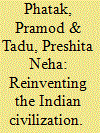

|
|
|
|
|
| Publication |
2014.
|
| Summary/Abstract |
"1 have travelled across the length and breadth of India and I have not seen one person who is a beggar, who is a thief Such wealth I have seen in this country, such high moral values, people of such calibre, that I do not think we would ever conquer this country, unless we break the very backbone of this nation, which is her spiritual and cultural 'heritage, and, therefore, I propose that we replace her old and ancient education system, her culture, for if the Indians think that all that is foreign and English is good and greater than their own, they will lose their self-esteem, their native self culture and they will become what we want them, a truly dominated nation. "
These words have been attributed to Macaulay's address to the British Parliament on 2"" February, 1835.
Though the authenticity is, of late, being questioned by certain quarters the detractors have yet not succeeded in convincingly proving their point and hence we take the above quoted words at face values. Needless to say that they speak volumes about the kind of society that India was.l For all those people who may still not believe this largely historical truth that India was a culturally rich and prosperous society, we would like to quote below Robert Clive's views about the city of Murshidabad presently in West Bengal which says that 'Murshidabad is a city of extensive, populous and rich as the city of London, with this difference, that there are individuals in the first possessing in?nitely greater property than in the last.
|
|
|
|
|
|
|
|
|
|
|
|
|
|
|
|
|
|
|
|
|